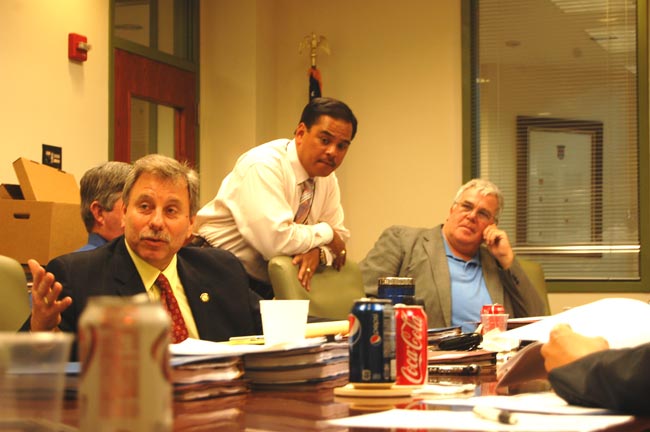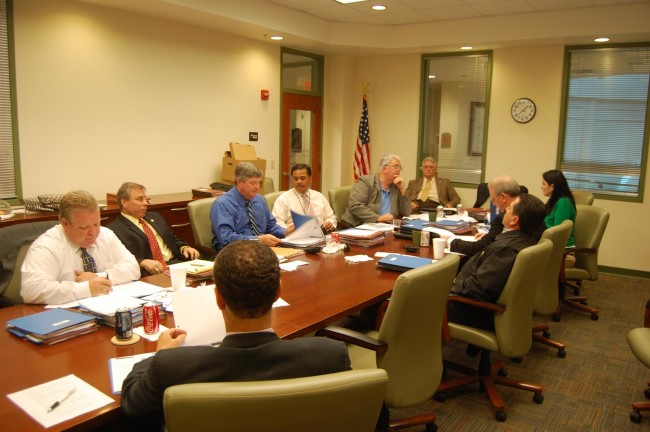
ST. AUGUSTINE–It is one of the most concentrated collection of tri-county, law-and-order testosterone you’re likely to see: 13 men and one woman, including State Attorney R.J. Larizza, Public Defender Jim Purdy, Flagler County Sheriff Don Fleming, Putnam County Sheriff Jeff Hardy, St. Augustine Police Chief Loran Luerdes, a medical examiner, a surgeon, a funeral director, and three county commissioners, including Flagler’s Milissa Holland—the lone woman—rimmed around a conference table in the St. Johns County administration building since 10 this morning, doing what some of these law enforcement types do best: Interrogating.
Or rather, interviewing to fill the now-vacant position of Medical Examiner for Flagler, St. Johns and Putnam counties.
The unusual—and unusually high-powered—gathering is indicative of the importance of the group’s task. The $181,000-a-year job has little public visibility, as do today’s interviews: none of the agencies involved went out of their way to announce or advertise the occasion. Yet medical examiners are among the most critical public servants to law enforcement, prosecutors, public defenders and the general public.
As Purdy put it: “It actually comes down to a matter of life and death. For the individual citizen, they want to know why, with accuracy, a loved one passed away. What was the cause of death? And the person that makes that determination has to be highly qualified to make that determination. In cases of public safety, dealing with a homicide, it is very important both to the accused of a crime, and to the victims’ families as well as the public at large to know for sure what the cause of death was, and whether it was in fact a homicide, a suicide or death by some other agency, so the selection of the person that’s going to be responsible for determining the cause of death serves a tremendous purpose to the criminal justice system as well as to the community as a whole, since one thing that we all have in common is that eventually we’re all going to die.”
The medical examiner’s office has been vacant since Jan. 1, when Terrence Steiner left after tendering his resignation about two months earlier. (Cases are being handled by the Volusia office). Law enforcement agencies were not unhappy he left. “The bottom line there is, when he tendered his resignation, we didn’t object to it,” Larizza said. “I don’t want to get into it much more than that.”
Fleming added a few details: “There was a lot of lack of communications would be the word, I guess you could say. Then when R.J. got in, we started seeing this, said it’s time to put somebody in there that we can communicate with, that we know is the perfect person to work with.”
Interview Committee:
- R. J. Larizza, State Attorney
- Jim Purdy, Public Defender
- Don Fleming, Flagler County Sheriff
- Jeff Hardy, Putnam County Sheriff
- Joel Bolante, chief of staff at the St. Johns County Sheriff’s Office
- Loran Luerdes, St. Augustine Police Chief
- Milissa Holland, Flagler County Commission
- Ron Sanchez, St. Johns County Commissioner
- Chip Laibel, Putnam County Commissioner
- Russell Vega, District 12 Medical Examiner
- Bob Mathis, Assistant State Attorney
- Bobby Hall, St. Johns County Fire Marshal
- Douglas Dew, Orthopedic Surgeon
- Karl Flagg, Funeral Director, Palatka
The medical examiner’s position is regulated by state law, down to the interviewing process: the state attorney is responsible for putting together a committee representative of all agencies with significant interest in the medical examiner’s office, and to invite candidates. The initial round drew just one applicant. A second round drew the five being interviewed today. The group was planning to rank today’s candidates’ by day’s end, choose its top three, and, following its background check on the top-most candidate, convey the recommendation to the Medical Examiner Commission.
Larizza, sitting in the middle of the oblong table, led the questioning, posing each candidate the same questions from a list of 12: how the candidate would face challenges of a solo practice in the three-county office (there’s just one medical examiner in District 23), how the candidate would manage a caseload that, in 2009—the last year for which numbers are available—generated 227 autopsies, how he or she would deal with innumerable people with interests in each case—police agencies, the courts, lawyers, families.
One of the question illustrates the intricacies of the job, which goes well beyond slicing bodies open and running toxicology reports: “How would you balance the legal and regulatory requirements for an autopsy in deaths where the families of the deceased have strong objections, sometimes based on religion?” Some candidates were more willing to negotiate with families than others, though not at the expense of a case’s integrity.
The question, like a few others, is designed to probe each applicant’s ability to maintain another requirement of the job: independence in the face of competing interests all bearing down on the medical examiner. Pressing one candidate, Larizza asked him how he’d ensure that he wouldn’t be “influenced or bullied or kowtowed or anything else by other agencies or stakeholders.” (The candidate on the interview seat at the time: Predag Bulic, currently a member of the Volusi County Medical Examiner’s office.
After every question, Larizza would ask others around the table if they had follow-ups. Most of the time, few did, though Holland took up Larizza on numerous occasions. She asked one candidate, for example, if he was comfortable with the district’s “hybrid” funding system of the medical examiner’s office: Unlike the Volusia district, where the medical examiner and his staff are all county employees, in the Flagler-St. Johns-Putnam district, the medical examiner is actually a private contractor who will negotiate his salary independently with each of the three county commissions, though the staff in the office is made up of public employees. That creates issues: the medical examiner does not actually supervise—hire or fire–his staff. St. Johns and Flagler counties’ administrations are interested in changing that model and possibly adopting Volusia’s, where the medical examiner is also a public employee. That would enable better controls and accountability. But the $181,000 salary is likely to go significantly higher when the new medical examiner is hired. Larizza says the former examiner was “underpaid.”
In another follow-up, Fleming was curious about one candidate’s experience with shaken-baby syndrome. It wasn’t an esoteric question, but rather a window into the sort of gray-area circumstances police deal with: the candidate (Peter Gillespie) turned out not to have had experience with such a case, which could be relevant in better understanding, and detecting, such instances.
“You have to be able to have a good working relationship, number 1,” Fleming said between two candidate interviews. “Number 2, it’s a crucial type of relationship for us. You have our front-line investigators who are handling these type of cases, going to the medical examiners with the body and explaining what they think, in other words they’re giving their two cents on what they think transpired, where he got shot, where he got stabbed, where the car accident occurred, and then it’s up to the medical examiner to sort of compile all this information and come up with a finding. That finding will be a make-or-break for us in a lot of cases.”
All five candidates interviewed today are doctors: Robert Whitmore, Marie Hermann, Peter Gillespie, Bulic, Jesse Giles and Daniel Trelka. The first was interviewed at 10 a.m. The last was interviewed after 3 p.m., following which the committee began deliberating.
Gillespie was ruled out immediately: he’s not board certified, which is a requirement of the job. (Gillespie took his boards four times unsuccessfully.) Giles left several members uncomfortable: he does not work as fast as committee members would like, his strong personality may leave him un-flexible in his relations with various agencies, and he admitted to not liking to get up in the middle of the night, which surprised some members and seemed indicative of the limits of his enthusiasm for the job. The two leading candidates were from the same office: Hermann and Bulic.
When Larizza called for a vote by a show of hand–as to who would be the committee’s Number 1 pick–Bulic got eight votes, locking him in as the first choice. Hermann was the second choice. Those picks were formalized in a motion. The committee then deliberated over a second alternate, even though none of the members were thrilled with the names they had left. Karl Flagg, the Palatka funeral director, objected to picking a third choice just to have a third choice, knowing that it’s a weak candidate. He proposed focusing on the top two. If they don’t work out, the committee should restart the process with fresh candidates. Holland seconded that approach. The committee agreed unanimously.
The committee adjourned at 4:40 p.m.
The interviewing committee doesn’t make the final decision. The governor does. This committee only makes a recommendation to the nine-member, statewide Medical Examiner Commission, which tends to defer judgment to the local committees. Two members of that statewide commission—Purdy and Russell Vega, the medical examiner in Sarasota-based District 12—were part of the local committee on Wednesday.






























Leave a Reply